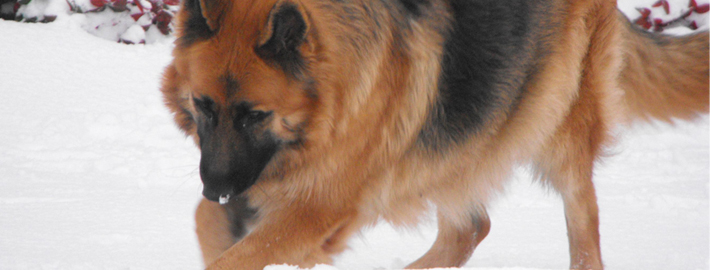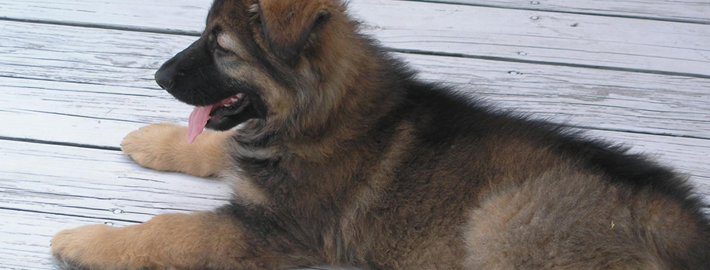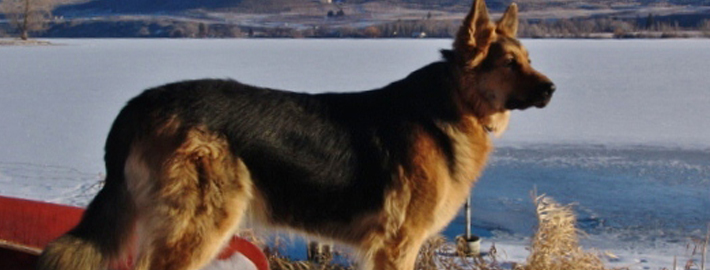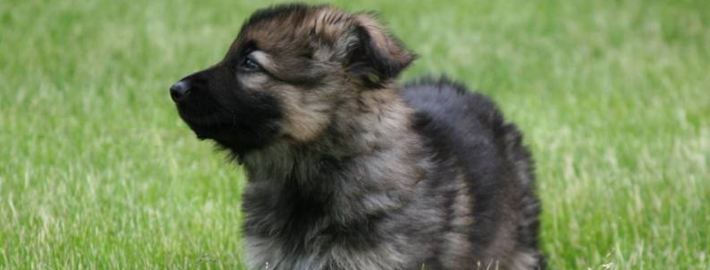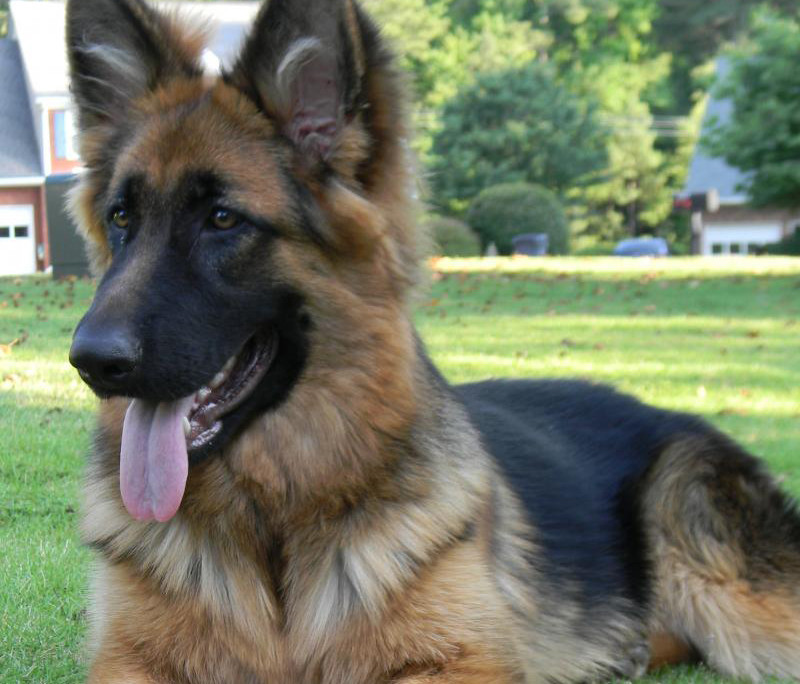What makes the King Shepherd Unique?
The King Shepherd is self-confident with a well-balanced personality and healthy nervous system. They should not exhibit any shyness or nervousness. They are extremely intelligent, easy to train and eager and faithful to please their owners. This breed makes a fine sheepherder and working dog. They are also a naturally courageous guard and watchdog, showing courage, strength, and hardiness in their role of protector.
Page Contents
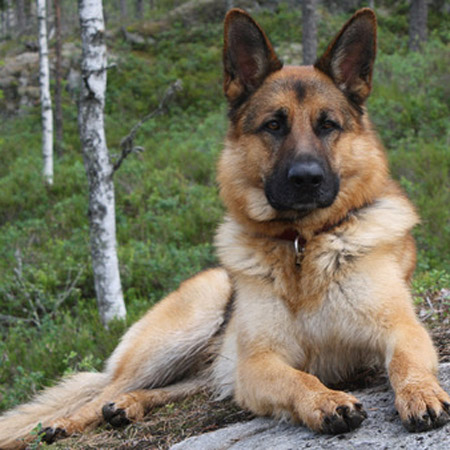
SnapShot
| Size: | Males – 69 to 81 cm (27 to 32 inches) Females – 64 to 71 cm (25 to 28 inches) |
| Weight: | Males – 41 to 68 kg (90 to 150 pounds) Females – 34 to 50 kg (75 to 110 pounds) |
| Origin: | United States of America |
| Life Span: | 10 – 11 Years |
| Colour: | Sable, Black Saddle with Tan, Gold, Cream, Tan or silver markings |
| Litter Size: | up to 10 puppies |
Is the King Shepherd Right For You?
The chief qualities of this outstanding breed are : a well-balanced nervous system, readiness, lack of inhibition, vigilance, incorruptibility, combined with courage and cleverness in defense. It is known to be an excellent watch-dog and guard-dog. The King Shepherd is characterized by unsurpassed loyalty towards its master and eagerness to please.
Owing to its huge size, the King Shepherd is not recommended for apartment life. Though the King Shepherd can prove to be a good companion for kids, they should be allowed to interact with kids only under close supervision because of their stature.
In 5 Words
- Athletic
- Intelligent
- Docile
- Obedient
- Friendly
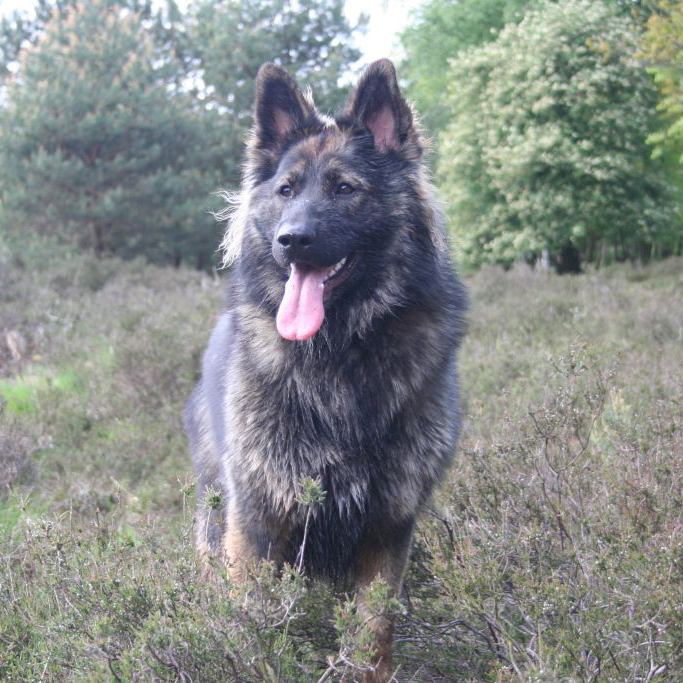
Characteristics
Learn About the King Shepherd
Description
General Description
The build of the King Shepherd is slightly long, robust and muscular; the structure is solid. The head is in good proportion to the body and moderately wide between the eyes. The forehead, seen from in front and in profile, is only slightly rounded, with or without a medial furrow which is moderately well defined.
The eyes are medium size and almond-shaped, set somewhat aslant and not protuberant, as nearly as possible matching the surrounding coat in shades of brown, and from very light to dark are acceptable. The chest is deep and broad. Thickly feathered, the tail reaches at least to the hocks. The tail is carried down and slightly curved; when excited or in movement, the dog raises the tail, which becomes more curved, without however, going beyond the vertical. It must not, moreover, lie on or curl up on the back.
Size
King Shepherds are much larger than German Shepherd Dogs. Males stand at 29-32 inches tall and 100-150 pounds while females are 25-29 inches tall and 75 to 110 pounds.
Coat
King Shepherds have a long-haired coat which may be coarse or wavy, and may not have a double coat. The prototypical King Shepherd is tan with a black back and mask, but King Shepherds come in a variety of colors including solid black, grey, brown, and yellow, tricolor (black, white, and brown or red), or sable (black and red, silver, or tan), plus a variety of marking designations including ‘penciling’ (black lines on the toes) and ‘tar heels’ (black on the back of the leg). King Shepherds may not be white, though in some countries this is considered a separate breed.
Short History of the King Shepherd
The King Shepherd is a large-sized German Shepherd Dog. The German Shepherd Dog was bred in the late 19th and early 20th century in a concerted effort to breed the ultimate sheepdog. Contrary to popular opinion, it is no more closely related to the wolf than any other breed of dog. A consortium of German breeders worked to make a brave, intelligent dog that could herd sheep and run quickly with great stamina. They produced an agile, powerful dog which quickly showed its usefulness at police work and guarding. German Shepherd Dogs became the most popular breed in America after the rise of German Shepherd movie star Rin Tin Tin, who thrilled audiences with astounding skills such as leaping nearly 12 feet high. Rin Tin Tin was known to dine on tenderloin steaks prepared by a personal chef. While no longer the country’s number one breed, the incredibly adaptable German Shepherd Dog is today a popular guard dog, police dog, guide dog, search-and-rescue dog, drug-sniffing dog, and pet. The King Shepherd was bred by American breeders in the 1990’s by crossing the German Shepherd Dog with the Alaskan Malamute and Great Pyrenees in an effort to make a larger variant.
Temperament
The King Shepherd is self-confident with a well-balanced personality and healthy nervous system. They should not exhibit any shyness or nervousness. They are extremely intelligent, easy to train and eager and faithful to please their owners. This breed makes a fine sheepherder and working dog. They are also a naturally courageous guard and watchdog, showing courage, strength, and hardiness in their role of protector. They make very nice companions and are friendly to other animals and children. They are a docile obedient breed with an easy gait and plenty of stamina.
Caring for Your King Shepherd
Grooming & Bathing
King shepherds are not recommended for apartment life. They are at their best in a yard with lots of room for running. The king shepherd takes well to strenuous activity, preferably combined with training of some sort. They are very intelligent and crave a good challenge. King shepherds need plenty of exercise, possibly more than the average breed. If this breed is not on a proper exercise regimen, it can grow restless, and even destructive.
Exercise & Training
As the King Shepherd holds tremendous energy and stamina, it needs vigorous exercise. The King Shepherd loves strenuous activities, preferably combined with training of some kind (e.g. obedience training), because these dogs are very intelligent and crave a good challenge.
They need to be taken on a daily brisk, long walk or jog. They also enjoy running alongside while its owner bicycles. If under-exercised, this breed can become restless and destructive.

